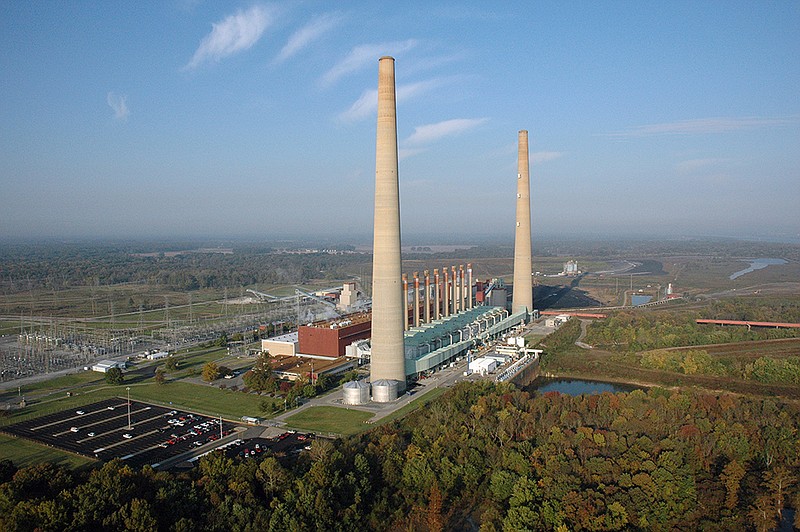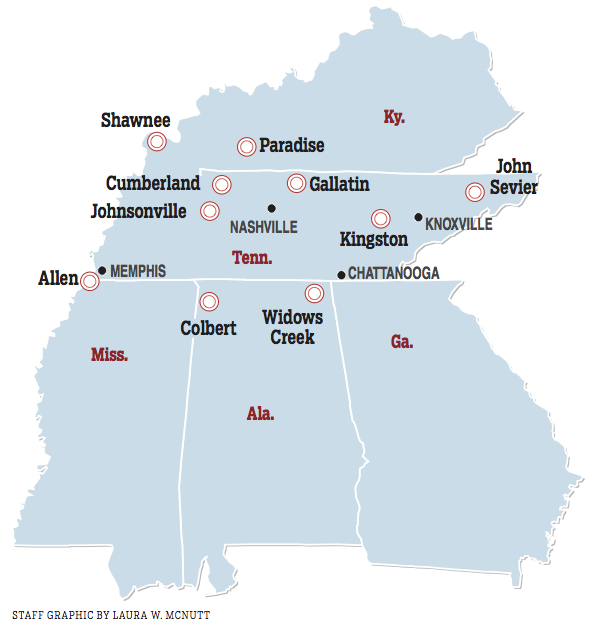Coal cutbacks
TVA either has or plans to shutter 33 of the 59 coal-fired units it once operated: Shut down * 4 units at John Sevier in Tennessee by 2014 * 7 units at Widows Creek in 2013 and 2014 * 10 units at Johnsonville retired by the end of 2017 * 3 units at Allen in Memphis by the end of 2018 * 5 units at the Colbert plant in Alabama by 2015 * 2 units at Paradise in Kentucky by 2016 Still running * 1 unit at Widows Creek in Alabama * 2 units at Cumberland near Nashville * 9 units at Kingston * 4 units at Gallatin * 1 unit at Paradise in Kentucky * 9 units at Shawnee, assuming TVA board accepts staff recommendation today Source: Tennessee Valley Authority
Over the past four years, the Tennessee Valley Authority has decided to shutter more than half of the 59 coal-fired power generators it once operated within its 7-state service territory to cut air pollution and comply with stricter environmental regulations.
But TVA directors today are expected to vote to keep operating a pair of 60-year-old coal units in Kentucky, even though the generators are no longer in TVA's service territory.
The TVA board has called a special meeting today at 10 a.m. to be conducted via a webcast among the eight directors to consider the future of units 1 and 4 at the Shawnee Fossil Plant in Paducah, Ky. The two generators are among 18 that TVA agreed in a 2011 consent order with EPA to either shut down or clean up by 2018.
Faced with a Wednesday deadline to tell EPA of its future plans for the two Shawnee units, TVA's staff is recommending that the utility install coal scrubbers and selective catalytic control (SCR) devices in the next two years on the Shawnee units to limit sulfur and nitrogen oxide emissions that contribute to smog.
An environmental assessment of the two units estimates that the pollution control devices can be installed for $175 million to $225 million only a fraction of the $1 billion expense for such controls at other larger TVA coal plants. Despite opposition from major environmental groups in the Tennessee Valley, TVA's staff concluded that continuing to stoke each of the two 134-megawatt units with coal "meets TVA's goal of maintaining a balanced portfolio of generation resources.
"These small coal-fired units have enhanced value on the TVA system because of their load following capabilities," TVA said in a final 75-page environmental assessment of the units.
TVA President Bill Johnson said last month that the Shawnee units will cost less to clean up and operate, even with the installation of required scrubbers and selective catalytic reduction devices, than other coal plants TVA recently decided to shut down. In the past year, TVA decided to shut down the Allen Steam Plant in Memphis and two of the three units at TVA's only other coal plant in Kentucky the Paradise Fossil Plant near Drakesboro, Ky. and replace the lost power with natural gas generation.
"Shawnee is a very good, flexible plant that differentiates itself from Allen and Paradise, which were higher costs and not in as good of material condition," Johnson said.
Although Paducah left the TVA system in 2006 and Shawnee is no longer within TVA's service territory, Johnson said TVA still owns and operates Shawnee and needs its power for the northern parts of its service territory. With scrubbers installed, TVA also could use more higher-sulfur Appalachian coal from the area around Shawnee, cutting fuel and coal shipment expenses.
"We still own the plant and it still produces electricity that we use so that (being outside of TVA's current territory) won't be a particular consideration," Johnson said.
Environmental groups have urged TVA to shut down the two coal units at Shawnee, as TVA has already done with most of the coal units at its John Sevier, Widows Creek, Colbert, Johnsonville, Paradise and Allen plants.
"Responsibly retiring these 60 year-old coal burners is far less costly than making major new investments in aging infrastructureespecially when TVA's own analysis says they are not even needed for reliability in the area," said Jonathan Levenshus, Tennessee Representative of the Sierra Club's Beyond Coal Campaign.
Critics of investing more money in Shawnee contend it could take decades to recover the money it would cost to retrofit the aging units, and conservation and alternative energy sources could negate the need for the units altogether.
"Instead of wastefully sinking over $200 million of its customers' hard-earned money into polluting coal burners on their last legs, TVA should invest this money into clean energy sources like wind, solar and energy efficiency that would provide the energy it needs while protecting the health of the families in West Paducah and the surrounding communities," said Mary Whittle, an attorney for Earthjustice.
But during a public comment period in the past two months, most of the 85 individual comments, including 21 from members of the International Brotherhood of Boilermakers Local Lodge 40, supported keeping the Shawnee units operating with coal.
Bryan Carner, chairman-elect of the Paducah Chamber of Commerce, appealed to TVA directors last month to keep all of the Shawnee units running to preserve more TVA jobs and help ensure adequate power for new industry that the Chamber is trying to recruit to replace the uranium enrichment plant that U.S. Enrichment Corp., shut down in May 2013. USEC was TVA's biggest single industrial customer, buying $600 million a year of power from TVA. But a drop in uranium demand forced USEC to close its Paducah plant, cutting 5 percent of TVA's overall power demand.
"Our community recently lost the Paducah gaseous diffusion plant and its 1,000 jobs and we don't need another blow to our economy," Carner said. "Investing in this (Shawnee) plant will provide long-term benefits for TVA and our community."
Even if TVA maintains all nine of its Shawnee coal units, Levenshus and other environmentalists still applaud TVA for cutting back on other coal-fired generation. Coal once supplied nearly two thirds of the electricity generated by the federal utility, but that share has been cut to about 40 percent of TVA's power today and Johnson has set a long-term goal of trimming coal generation to about 20 percent of TVA's production portfolio.
The rest of TVA's power would come from nuclear plants, natural gas-fired turbines and renewable sources, including TVA's hydroelectric dams.
"TVA is clearly moving in the right direction away from coal-fired generation, and, if this decision on Shawnee goes against that trend, we certainly hope that TVA will reconsider it later and the Integrated Resource Plan now under development will show better alternatives to coal," Levenshus said.
But Johnson said the economics at this time favor keeping the Shawnee coal units and retiring those units now "is a one-way option" that can't be reversed.
"If you decide to scrub, you can change your mind (and shut down the units) any time until December 2017," Johnson said following the TVA board meeting in Nashville last month.
The Shawnee plant is located on 1,696 acres along the Ohio River northwest of Paducah, Ky. Construction of the 10-unit plant began in 1951 and was completed by 1956.
TVA experimented with Shawnee Unit 10 in the 1980s by converting the coal-fired unit to an atmospheric fluidized bed boiler. But the experiment failed to work as planned and TVA removed the unit from service in 2010 and formally retired Unit 10 earlier this year.
The nine remaining coal units are operated on automatic generation control and can be started up and shut down relatively quickly to respond to changes in energy demand.
"When you evaluate plants like this, you look at what is the cost of the output, what is the historic performance, what is the material condition of the plant and how does it fit into the demand profile," Johnson said. "In those categories, these Shawnee units are very low cost and very good performance compared with many of our other coal units.
Today's board meeting will be the first for Virginia Lodge of Nashville and Ronald Walter of Memphis. The new TVA directors were sworn into office last week, replacing Barbara Haskew of Chattanooga and Bill Sansom of Memphis.
Contact Dave Flessner at dflessner@timefreepress.com or at 757-6340.

